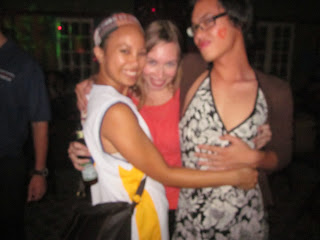As I turned to my bag to grab my water bottle, I caught him at the
corner of my eye. He was greeting Cau Dai, who just arrived to visit Di Ngoc
for the afternoon. I walked out to the front and saw him. My Ba. His green,
short-sleeved collar shirt hung loosely around his body. Even as a new shirt
(Costco-shopping recently, Ba?), it couldn’t hide how much weight he had been
losing. His brown, multi-pocketed pants seemed to be influenced by the
skinny-pants generation, but those also seemed to fit him as perfectly as a
paper bags designated for those long baguettes they sell outside Big C. As I
soaked in the mere fact that my father was here in Da Nang, I almost failed to
notice him beckoning me over. After two downward waves towards the palms, I
held my father lightly in my arms, fearing that I could possibly break him with
an over-anxious hug. And just like that, we were reunited.
We headed over to Co Minh’s for lunch in a Mailinh taxi. When we
arrived, a big pot of bun bo Hue was awaiting us – or more so my dad since
that’s his favorite dish and I already ate at Di Ngoc’s. Our other relatives
joined us after their lunch as well, and as they all conversed, I felt the
familiarity that I had missed for a long time. In most cases, I find myself
struggling to understand the Vietnamese being spoken around me, but with my Ba
here, every single word seemed to make sense. I felt I wasn’t just listening
with my ears; I was also listening with my heart.
After lunch, my dad borrowed Co Minh’s motorbike to take us around the
city. I recommended we sit down and have coffee at Highlands Coffee, which had
a nice view of the river along Bach Dang. When we sat down and talked, we
immediately converted to Viet-lish, as we recognized that there were subjects
that could only be expressed in one language or the other. After we talked
about my cultural observations and future aspirations, we got to talk about him
-- the topic I had been awaiting for a long time. And without even prying, he
told me more than I ever knew: his stay at the Nagasaki refugee camp; his
unapproved excursion to Tokyo that set the precedent for other refugees to stay
in their own camps; his life regrets and his positive turn-around because of them; his love for salsa dancing; his current participation in a
Vietnamese choir; his adolescence in Sai Gon… things that I never knew, and it
took me a fellowship to Vietnam to find out.
As he talked about his past, I saw his eyes shine in a way I had never
noticed before. Whiskers formed at the outer corner of his eyes as both rows of
teeth gleamed at me, then shyly toward the window. He giddily shifted around in
his seat and laughed until his eyes moistened, and my eyes couldn’t help but
water as well – mostly because I wished that this were the Ba I had the
patience to get to know growing up. Once I mentally slapped myself to remind
myself to enjoy the moment for what it was, I straightened myself out and
continued to engage in his company.
The rest of the day consisted of us motorbiking around town, and
exchanging stories every time we were reminded of something to tell each other.
Something that stood out to me in our conversation was his recognition of his
talents and his weaknesses.
“You know,” he spoke toward the traffic as we maneuvered between other
motorbikes and through traffic lights, ”I could’ve been a famous singer. I had
the voice for it, and the charisma. But God gave me poor health.”
I thought a bit about his last statement, and then spoke in the same
direction over his left shoulder. “Well, if you became a famous singer, you may
not have had the opportunity to have two wonderful daughters.”
“That’s true,” he responded without pause. “Things happen for a reason.”
Besides finding out how much pride he actually took in his singing (the
CD he recorded and distributed to our relatives has yet to make my iTunes), I
was surprised to hear him talk about his health that way. If there’s anything
that my sister and I get from our dad, it’s our pride, and we’re not usually
one to admit our weaknesses so willingly. But to hear him say that really
allowed me to experience a side of my dad that I feel like I rarely experience:
vulnerability. And yet, his willingness to share that with me further affirmed
my admiration for his character.
Today was just the first day of the few that I will experience with my
father for the next week. Tomorrow, we will hang out in Da Nang again, and then
he will catch up with me in Hue later on in the week. If this foreshadows what
I will continue to learn about my father, I have much to look forward to this
week.





